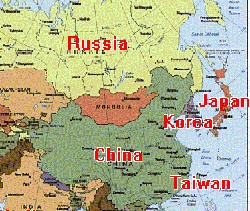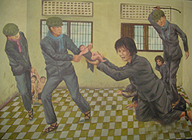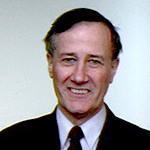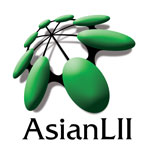Analysis
|
Russia’s dealings with northeast Asia are driven by the overwhelmingly pro-Western orientation of the Russian political elite. Thus relations with its Asian neighbours are primarily used to offset weaknesses and disappointments in Russia’s dialogue with the West. Russia and China The Iraq war prompted China and Russia to pay more attention to their strategic partnership and to find a counterbalance to the only superpower in the world. A joint Sino-Russian statement in July 2005 renounced “monopoly or domination of world affairs”. This was backed up the following August by the first Sino-Russian joint military manoeuvres. While these were officially said to be about combating terrorist groups, they actually looked more like exercises in fighting a regular army. Russia was also the first country with whom China has established a mechanism for bilateral strategic consultations. While economic ties have strengthened significantly, these are not without their problems for Russia:
Demographic factors are also an issue. During last 15 years the population |
of the Russian Far East declined by nearly 10 per
cent. However the region is seeing an increasing flow of illegal immigration
from China, something Russia must decide how to manage.
Russia and Japan Japanese perceptions of a growing Chinese threat may become a driving force for improved Russo-Japanese relations. Moscow and Tokyo are again exploring ways to resolve a long standing dispute over the Kurile Islands (the Northern Territories), with recent discussion including the idea of splitting the islands’ total area between the two countries. As Japan strives to reduce its dependence on oil from the Middle East, it is showing interest in Russia’s supplies of oil and natural gas and has been successful in persuading Moscow to build an oil pipeline from East Siberia to the Pacific, bypassing China. Russia and North Korea Russia has mostly played a role of passive observer at the six-party talks on Pyongyang's nuclear program. It has, however, increased the supply of oil to the North Korean regime and there are reports that North Korea has offered Russia exclusive rights to its uranium deposits in exchange for support at the talks. This suggests that Russia is trying to re-establish its influence in the north of the Korean Peninsula. |
To conclude, Russia has failed to develop an integrated policy towards Northeast Asia. It shows little real interest in Asian affairs, with its main objective simply to demonstrate its presence there. While Russia continues to subordinate its economic interests to a political agenda, it will find itself the weaker side in the Sino-Russian dialogue; prevented from achieving real progress in relations with Japan; and without a consistent and transparent policy on the two Koreas. Links:
|

 |
RECLAIMING ANGKORby Francesca Beddie, editor, Asian Currents |
| Like the ruins of the ancient Khmer capital, Angkor, modern-day Cambodia is emerging back into the world after the isolation imposed by the Khmer Rouge in the 1970s and 1980s.
Those ornate buildings, lost to the outside world for centuries, are now the fuel for Cambodia's burgeoning tourism industry, growing at around 30 per cent a year, with almost 1.3 million people visiting in 2005. Tourism is, however, bringing new problems, in particular to Angkor. Hotels and other infrastructure are being constructed without proper knowledge of what remains of the vast city below. Fortunately, the magnificence of Angkor put it onto the World Heritage List, and multi-national efforts to protect it mean it is no longer classified as an endangered site, although UNESCO has identified the next ten years as the critical period of development for Angkor. One of those multi-national collaborations is the Greater
Angkor Project (GAP) based at the University of Sydney. It has brought
together French, Cambodian and Australian researchers across many disciplines.
These include archaeologists, remote sensing experts, palaeo-botanists, |
hydraulic engineers and soil scientists who are seeking to find out what happened to the ancient city and to discover the true scale of its low density settlement. The University of Sydney's archaeological team is discovering how the Khmer engineers of the Middle Ages channelled water into an enormous infrastructure of reservoirs, canals and embankments for practical as well as symbolic reasons. Their findings are casting new light on how such a sophisticated society could be reclaimed by the surrounding jungle and may also give insights to other archaeologists about how to combine social and ecological approaches to their investigations. In addition, future urban planners may well glean important lessons about the risks of engineering nature.
Another aspect of the University of Sydney's engagement with Angkor is the 'The Living with Heritage' project. This project seeks to help the Cambodians meet the conflicting demands of conservation, economic development and social equity at a World Heritage site. The project aims to create a monitoring system to assist in implementing heritage policies that can achieve sustainable development of a type which is integrated with, and sensitive to, community needs, rights and aspirations. The complex of research activity at Angkor is demonstrating the power of interdisciplinary collaboration both across academic disciplines and between universities, government agencies and consulting companies around the world. It not only bodes well for the resuscitation of the magnificent city for its Cambodian inhabitants and their visitors but may also offer us all lessons about the very nature of societal collapse. |
Comments on this article may be directed to the editor at fbeddie@ozemail.com.au
Links:
|

Profile
|
This month we profile Michael Leigh,
Professor of Contemporary Asia at the Asia Institute and incoming President
of the Asian Studies Association of Australian http://www.asiainstitute.unimelb.edu.au/people/staff/leigh.html |
||
|
One of the clear obstacles to developing understanding
was the white Australia policy. My own political initiation was as an
activist in the Immigration Reform Group, in a year when the Sharpeville
massacre underlined the dire consequences of racialism, of efforts to
maintain an order based upon the myth of European superiority. Q: What are your current preoccupations? My own current preoccupations also relate to the issues of ‘nation-retention’, of how and why the European-derived boundaries of the nation-states of the region have been reified and maintained, almost at any cost. |
My research now includes a comparative examination of the processes of incorporation of the resource-rich provinces of Aceh and Sarawak within their respective nation-states. Q: How do these fit into the contemporary scene? Since taking up the Directorship of the Asia Institute at the University of Melbourne, much of my energies have been devoted to helping re-establish research training in Aceh in the wake of the December 2004 tsunami, and doing so in collaboration with a consortium of eight Australian and four Indonesian Universities. Q: What are your hopes for Asian studies in
Australia? Links:
|
|

Researcher of the month
|
Vicki Crinis, now a postdoctoral fellow at the University of Wollongong’s Centre for Asia-Pacific Social Transformation Studies (CAPSTRANS), started her university studies as a mature age student. She completed a BA (Honours) majoring in English Literature and Southeast Asian Studies at the University of Wollongong. She had not planned to study Southeast Asian history, but at the time had four young children and had to choose subjects that were taught during school hours. In the first year Ben Kiernan’s lectures on Southeast Asia inspired her interest in a past that put more recent events, |
such as the Vietnam War and the Race Riots in Malaysia, in perspective. In the second year Melanie Beresford kindled her enthusiasm for labour studies by questioning export-oriented industrialisation and the feminisation of factory work in Southeast Asia. In her Honours year, Vicki did a comparative study of the garment industry in Australia and Malaysia, discovering that in many ways Australian garment workers were not any better off than their Malaysian counterparts. The literature on light manufacturing she read for her Honours thesis became the platform for a PhD. Under the supervision of Jan Elliott and Adrian Vickers, Vicki examined the evolution of discourses about women and work using colonial records and literature, Malaysian government documents, Mahathir’s writings and contemporary media reports. Since graduating in 2004, Vicki has been researching women and unions in Malaysia and the garment industry in the Asia Pacific. |

Website of the month
|
The Asian Legal Information Institute is a gateway that allows simultaneous searching of more than 100 databases containing legislation, case-law, law reform reports and legal journals from 27 countries including the Philippines, Indonesia, Japan, Pakistan, Mongolia and East Timor. |
Recent article of interest
|
In 2007 the Australian Government will host the Asia-Pacific Economic Cooperation (APEC) forum with a series of APEC meetings which began in January and culminated in the leaders’ meeting in Sydney in September 2007. http://www.apec2007.org/ To set the scene, we draw your attention to a speech the Foreign Minister, Alexander Downer, made to the East Asia Policy Forum in Los Angeles on 12 January. Here he argues that the United States needs to remain active and involved not just in the commercial side of East Asia and its rapidly growing economies, particularly China, but also in the security architecture of the region. See http://www.foreignminister.gov.au/transcripts/2007/070112_eapf.html |

Did you know?
| A consortium of four universities:
the University of New England, the University of the Sunshine Coast,
the University of Tasmania and Charles Darwin University, has received
significant funding ($369,000) from the Collaboration and Structural
Reform Fund to develop innovative ways to teach Indonesian. The consortium
will pool their Indonesian teaching and curriculum development resources
and, from 2009, will collaborate in providing Indonesian at each of
their institutions, as well as offering a 'blended model' of face-to-face
and online delivery at other regional universities. This will include
a short in-country programme at Universitas Mataram in Nusa Tenggara
Barat. |

Diary dates
| FIRST INTERNATIONAL
CONFERENCE OF ACEH AND INDIAN OCEAN STUDIES, 23-26 February 2007, Banda
Aceh. The Asia Research Institute, National University of Singapore,
and the Rehabilitation and Reconstruction Executing Agency for Aceh
and Nias (BRR) are sponsoring a conference which will cover topics as
diverse as seismology, geology and environmental impact; the history
of Aceh and the Indian Ocean world; post-tsunami relief, reconstruction
and disaster mitigation; conflict resolution, peace-making and democratisation;and
Islam, law and society. See http://www.ari.nus.edu.sg/ TRANSNATIONAL ENVIRONMENTAL CRIME IN THE ASIA PACIFIC, 22 March 2007, Canberra. A public forum hosted by the Department of International Relations at the Australian National University will examine how to tackle crimes such as illegal logging and timber smuggling, species smuggling, the black market in ozone depleting substances, the illegal movement of toxic and hazardous waste and other prohibited chemicals. 9.00 am to 3.30 pm at the Innovations Lecture Theatre, cnr Eggleston and Garran Roads on the ANU campus. Registration $77.00 ($28.00 for students). See http://rspas.anu.edu.au/ir/tec or contact Lorraine.Elliott@anu.edu.au GLOBAL SECURITY ASIA 2007, 27-29 March 2007, Singapore. Global Security Asia 2007 www.globalsecasia.com will be a forum for the international homeland security industry to showcase their latest equipment, systems and services in order to meet the current and future demands in the Asia Pacific region. Austrade will coordinate an Australian National Stand at this exhibition and offers a business and support services to participants. Contact Christopher Soh, Senior Business Development Manager, Austrade Singapore, christopher.soh@austrade.gov.au |
SOUTH ASIA ENGAGED, 27-29 April 2007, Los Angeles. The South Asian Studies Alliance is hosting its foundation conference with a focus on how South Asia is being integrated into the world. The proposal deadline is 18 February 2007. See http://sasia.org CHINESE STUDIES ASSOCIATION OF AUSTRALIA, 10th Biennial Conference, 27-29 June 2007, Brisbane. Griffith University, will be hosting the conference at Southbank in Brisbane. Watch the website for details: http://www.csaa.org.au/news.html 2ND ASIAN AUSTRALIAN IDENTITIES conference, 28-30 June 2007, Melbourne. The organisers welcome papers and presentations exploring Asian Australian identities, histories, cultures and politics. All presentations should be of 20 minutes duration. Abstracts (max 200 words) and a short bio (max 200 words) should be sent to admin@asianaustralianstudies.org or contact the convenors, tseen.khoo@arts.monash.edu.au or jacqueline.lo@anu.edu.au IN SEARCH OF RECONCILIATION AND PEACE IN INDONESIA,
workshop 19 and 20 July 2007, Singapore. The Indonesia Study
Group, Asia Research Institute, National University of Singapore is
holding an interdisciplinary workshop to examine approaches to reconciliation
and peace in Indonesia. Its aim is to provide insights into ways forward
not only for Indonesia, but for conflict situations much more broadly.
http://www.ari.nus.edu.sg or
contact the convenor, Dr Birgit Bräuchler aribb@nus.edu.sg
|

You are welcome to advertise Asia-related events in this space. Send details to: fbeddie@ozemail.com.au
Feedback
What would be useful for you? Human interest stories, profiles of successful graduates of Asian studies, more news about what's on, moderated discussions on topical issues? Send your ideas to fbeddie@ozemail.com.au.
About the ASAA
The Asian Studies Association of Australia (ASAA) promotes
the study of Asian languages, societies, cultures, and politics in Australia,
supports teaching and research in Asian studies and works towards an understanding
of Asia in the community at large. It publishes the Asian Studies Review
journal and holds a biennial conference. ASAA and the Centre for Language
Studies at National University of Singapore also co-publish an annual supplementary
issue of the Centre's fully peer-reviewed electronic Foreign Language Teaching
Journal (e-FLT). See http://e-flt.nus.edu.sg
The ASAA believes there is an urgent need to develop a strategy to preserve,
renew and extend Australian expertise about Asia. It has called on the government
to show national leadership in the promotion of Australia’s Asia knowledge
and skills. See Maximizing Australia's Asia Knowledge Repositioning and
Renewal of a National Asset http://coombs.anu.edu.au/SpecialProj/ASAA/asia-knowledge-book-v70.pdf
Asian Currents is published by the Asian Studies Association of Australia (ASAA) http://coombs.anu.edu.au/ASAA/ thanks to a grant from the International Centre of Excellence for Asia Pacific Studies (ICEAPS) http://iceaps.anu.edu.au. It is edited by Francesca Beddie. The editorial board consists of Robert Cribb, ASAA President, Michele Ford, ASAA Secretary, Mina Roces, ASAA Publications officer, Tamara Jacka, ASAA Council member, and Ann Kumar, Director, ICEAPS.


 Nevertheless,
Cambodia remains one of the world's least developed countries. It is
highly dependent on rice which, while less than 30 per cent of agricultural
output by value, is grown by about 80 per cent of rural families on
some 90 per cent of the country's total cultivated land area. It was
also rice that helped sustain the Khmer empire and enabled its kings
to build their extraordinary palaces and temples.
Nevertheless,
Cambodia remains one of the world's least developed countries. It is
highly dependent on rice which, while less than 30 per cent of agricultural
output by value, is grown by about 80 per cent of rural families on
some 90 per cent of the country's total cultivated land area. It was
also rice that helped sustain the Khmer empire and enabled its kings
to build their extraordinary palaces and temples. 
 Q:
When did you become interested in studying Asia and why?
Q:
When did you become interested in studying Asia and why? Dr
Vicki Crinis
Dr
Vicki Crinis http://www.asianlii.org
http://www.asianlii.org